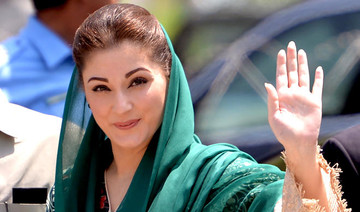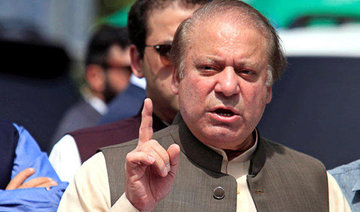LAHORE: The Lahore High Court directed the Pakistan Electronic Media Regulatory Authority (PEMRA) on Monday to prevent the broadcast of anti-judiciary remarks by disqualified Prime Minister Nawaz Sharif, his daughter Maryam Nawaz, and officials of the Pakistan Muslim League — Nawaz (PML-N).
The order was passed in response to a petition by the Judicial Activism Forum that said Sharif and his daughter had been making derogatory remarks about the judiciary in public rallies and media interactions.
The court instructed PEMRA to decide on all complaints regarding the broadcast of anti-judiciary remarks by Sharif and his daughter within 15 days, and to ensure that such content is not broadcast by anyone.
While legal experts say the decision is in line with Pakistan’s constitution, some think its implementation could be difficult.
“Freedom of speech is a fundamental right of every citizen,” Barrister Ali Zafar, former president of the Supreme Court Bar Association, told Arab News.
“It’s guaranteed by the constitution, though within certain limits. One can’t, for instance, make anti-judiciary comments,” he added.
“So the court’s decision is correct, but it will still be difficult to implement. In case of a live transmission, no one can predict what a speaker is going to say.”
Many analysts lauded the decision, saying it will result in responsible journalism in Pakistan. “It is part of the code of conduct that a (judicial) matter cannot be discussed until the court takes the final decision; however, news channels have been crossing the limit by broadcasting talk shows on such cases,” said Chudhry Khadim Huddain, editor of a national daily.
Lahore High Court bans airing of anti-judiciary speeches by Nawaz Sharif
Lahore High Court bans airing of anti-judiciary speeches by Nawaz Sharif

- Legal experts laud the ruling, but say implementation could be difficult
Malaysian court drops one of the graft cases against jailed former premier Najib Razak

Najib had already been convicted in his first graft case tied to the 1Malaysia Development Berhad state fund, or 1MBD, scandal and began serving time in 2022 after losing his final appeal in his first graft case.
But he faces other graft trials including Wednesday’s case in which he was jointly charged with ex-treasury chief Irwan Serigar Abdullah with six counts of misappropriating 6.6 billion ringgit ($1.5 billion) in public funds. The money was intended as 1MDB’s settlement payment to Abu Dhabi’s International Petroleum Investment Company.
The Kuala Lumpur High Court discharged the pair after ruling that procedural delays and prosecutors’ failure to hand over key documents were unfair to the defense, said Najib’s lawyer, Muhammad Farhan. A discharge doesn’t mean an acquittal as prosecutors reserve the right to revive charges against them, he said.
“The decision today was based on the non-disclosure of critical documents, six years after the initial charges were brought up, which are relevant to our client’s defense preparation. Therefore the court correctly exercised its jurisdiction to discharge our client of the charges,” Farhan said.
Najib set up 1MDB shortly after taking power in 2009. Investigators allege more than $4.5 billion was stolen from the fund and laundered by his associates to finance Hollywood films and extravagant purchases. The scandal upended Najib’s government and he was defeated in the 2018 election.
Najib, 71, issued a rare apology in October for the scandal “under his watch” but reiterated his innocence.
Last month, he was ordered to enter his defense in another key case that ties him directly to the 1MDB scandal. The court ruled that the prosecution established its case on four charges of abuse of power to obtain over $700 million from the fund that went into Najib’s bank accounts between 2011 and 2014, and 21 counts of money laundering involving the same amount.
In addition, Najib still has another money laundering trial. His wife Rosmah Mansor and other senior government officials also face corruption charges.
Pakistan ends lockdown of its capital after Imran Khan supporters are dispersed by police

- The police operation came hours after thousands of Khan supporters, defying government warnings, broke through a barrier of shipping containers
- Tension has been high in Islamabad since Sunday when supporters of the former prime minister began a “long march” from the restive northwest to demand Khan’s release
ISLAMABAD: Authorities reopened roads linking Pakistan’s capital with the rest of the country, ending a four-day lockdown, on Wednesday after using tear gas and firing into the air to disperse supporters of imprisoned former Prime Minister Imran Khan who marched to Islamabad to demand his release from prison.
“All roads are being reopened, and the demonstrators have been dispersed,” Interior Minister Mohsin Naqvi said.
Khan’s wife, Bushra Bibi, who was leading the protest, and other demonstrators fled in vehicles when police pushed back against the rallygoers following clashes in which at least seven people were killed.
The police operation came hours after thousands of Khan supporters, defying government warnings, broke through a barrier of shipping containers blocking off Islamabad and entered a high-security zone, where they clashed with security forces.
Tension has been high in Islamabad since Sunday when supporters of the former prime minister began a “long march” from the restive northwest to demand his release. Khan has been in a prison for over a year and faces more than 150 criminal cases that his party says are politically motivated.
Hundreds of demonstrators have been arrested since Sunday.
Bibi and leaders of her husband’s Pakistan Tehreek-e-Insaf party fled to Mansehra in Khyber Pakhtunkhwa province, where the party still rules.
Khan, who remains a popular opposition figure, was ousted in 2022 through a no-confidence vote in Parliament.
Anti-mine treaty signatories slam US decision to send land mines to Ukraine

- Ukraine President Volodymyr Zelensky has called the mines “very important” to halting Russian attacks
- Ukraine receiving US mine shipments would be in “direct violation” of the anti-mine treaty
Siem Reap, Cambodia: Washington’s decision to give anti-personnel mines to Ukraine is the biggest blow yet to a landmark anti-mine treaty, its signatories said during a meeting.
Ukraine is a signatory to the Anti-Personnel Mine Ban Convention which prohibits the use, stockpiling, production and transfer of land mines.
The United States, which has not signed up to the treaty, said last week it would transfer land mines to Ukraine to aid its efforts fighting Russia’s invasion.
Ukraine President Volodymyr Zelensky has called the mines “very important” to halting Russian attacks.
Ukraine receiving US mine shipments would be in “direct violation” of the treaty, the convention of its signatories said in a statement released late Tuesday.
“In the 25 years since the Convention entered into force, this landmark humanitarian disarmament treaty had never faced such a challenge to its integrity,” it said.
“The Convention community must remain united in its resolve to uphold the Convention’s norms and principles.”
Ukraine’s delegation to a conference on progress under the anti-landmine treaty in Cambodia on Tuesday did not mention the US offer in its remarks.
In its presentation, Ukrainian defense official Oleksandr Riabtsev said Russia was carrying out “genocidal activities” by laying land mines on its territory.
Riabtsev refused to comment when asked by AFP journalists about the US land mines offer on Wednesday.
Ukraine’s commitment to destroy its land mine stockpiles left over from the Soviet Union was also “currently not possible” due to Russia’s invasion, defense ministry official Yevhenii Kivshyk told the conference.
Moscow and Kyiv have been ratcheting up their drone and missile attacks, with Ukraine recently firing US long-range missiles at Russia and the Kremlin retaliating with an experimental hypersonic missile.
The Siem Reap conference is a five-yearly meeting held by signatories to the anti-landmine treaty to assess progress in its objective toward a world without antipersonnel mines.
On Tuesday, land mine victims from across the world gathered at the meeting to protest Washington’s decision.
More than 100 demonstrators lined the walkway taken by delegates to the conference venue in Cambodia’s Siem Reap.
Turkiye scales down $23 bln F-16 jet deal with US, minister says

ANKARA: Turkiye has reduced its planned $23 billion acquisition of an F-16 fighter jet package from the United States, scrapping the purchase of 79 modernization kits for its existing fleet, Defense Minister Yasar Guler said late on Tuesday.
NATO member Turkiye earlier this year secured a deal to procure 40 F-16 fighter jets and 79 modernization kits for its existing F-16s from the United States, after a long-delayed process.
“An initial payment has been made for the procurement of F-16 Block-70. A payment of $1.4 billion has been made. With this, we will buy 40 F-16 Block-70 Viper and we were going to buy 79 modernization kits,” Guler told a parliamentary hearing.
“We gave up on this 79. This is why we gave up: Our Turkish Aerospace Industries (TUSAS) facilities are capable of carrying out this modernization on their own, so we deferred to them,” he said.
The sale of the 40 new Lockheed Martin F-16 jets and ammunition for them will cost Turkiye some $7 billion, Guler added.
Turkiye placed its order in October 2021, two years after the United States kicked the country out of the fifth-generation F-35 fighter jet program over its procurement of a Russian missile defense system.
Turkiye wants to re-join the F-35 program and buy 40 new F-35 jets, Guler also said.
Turkiye is one of the largest operators of F-16s, with its fleet made up of more than 200 older Block 30, 40 and 50 models.
Ankara is also interested in buying Eurofighter Typhoon fighter jets, built by a consortium of Germany, Britain, Italy and Spain.
It is also developing its own combat aircraft, KAAN.
Ukrainian delegation visiting Seoul to ask for weapons aid, media reports say

- The group was expected to meet their South Korean counterparts as early as Wednesday, according to the report
SEOUL: A Ukrainian delegation led by Defense Minister Rustem Umerov is visiting South Korea this week to ask for weapons aid to be used by Kyiv in its war with Russia, according to media reports.
The delegation had met with South Korea’s National Security Adviser Shin Won-sik to exchange views on the conflict in Ukraine, the DongA Ilbo newspaper reported on Wednesday, without giving a source.
In an interview with South Korean broadcaster KBS in October, Ukraine’s President Volodymyr Zelensky said Kyiv would send a detailed request to Seoul for arms support including artillery and an air defense systems.
The South China Morning Post also reported this week that a Ukrainian delegation was due to visit South Korea to request weapons aid, citing an informed source.
The group was expected to meet their South Korean counterparts as early as Wednesday, according to the report.
A spokesperson for South Korea’s defense ministry declined to confirm when asked whether a Ukrainian delegation had arrived in Seoul during a regular media briefing on Tuesday.
Seoul, which has emerged as a leading arms producer, has been under pressure from some Western countries and Kyiv to provide Ukraine with lethal weapons but has so far focused on non-lethal aid including demining equipment.
South Korea’s Foreign Minister Cho Tae-yul, asked earlier this month whether Seoul would send weapons to Ukraine in response to North Korea aiding Russia, said all possible scenarios were under consideration and Seoul would be watching the level of participation by North Korean troops in Russia and what Pyongyang received from Moscow in return.


















